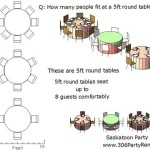Round Table Lunch: Exploring Its Benefits and Challenges
Round table lunches, where participants gather at a circular table to facilitate open and inclusive discussions, have gained immense popularity in both professional and social settings. These gatherings offer a unique opportunity for individuals to connect, share ideas, and engage in meaningful dialogue. However, like any endeavor, round table lunches come with their own set of benefits and challenges.
Benefits of Round Table Lunches
1. Enhanced Communication and Collaboration
The round table format promotes equal participation, allowing all attendees to actively engage in the discussion. This open dialogue fosters better communication and collaboration, leading to more innovative ideas and effective decision-making.
2. Breaking Down Barriers
The circular seating arrangement eliminates hierarchical structures, creating a level playing field where everyone's opinions are valued. This helps break down barriers and allows for more open and candid discussions.
3. Inclusivity and Diversity
Round table lunches encourage participation from a diverse range of perspectives and experiences. This inclusivity fosters a sense of belonging and ensures that everyone's voice is heard, leading to richer and more insightful discussions.
4. Networking Opportunities
These gatherings provide an excellent platform for networking and building relationships. The informal setting allows attendees to connect with like-minded individuals and explore potential collaborations.
Challenges of Round Table Lunches
1. Domination of Discussions
In some cases, certain individuals may dominate the conversation, limiting the participation of others. Facilitators must ensure that everyone has an equal opportunity to share their thoughts and ideas.
2. Lack of Structure
Without clear guidelines or an agenda, round table lunches can become disorganized and unproductive. Establishing a structured framework can help keep the discussions focused and ensure that all topics are addressed.
3. Time Constraints
Round table lunches often have limited timeframes, which can make it challenging to cover all desired topics. Prioritizing key discussion points and managing time effectively is crucial.
4. Managing Sensitive Issues
Discussing sensitive or controversial topics can be challenging in a round table setting. Facilitators must create a safe and respectful environment where differing opinions can be expressed constructively.
Conclusion
Round table lunches offer numerous benefits for open communication, collaboration, inclusivity, and networking. By understanding the challenges and implementing effective strategies to mitigate them, organizers can create productive and engaging gatherings. Whether for brainstorming, problem-solving, or building relationships, round table lunches can be a powerful tool for fostering meaningful connections and achieving desired outcomes.

A Step By Guide To Planning Work Sessionlab

Ldquo Let Rsquo S Use This Mess To Our Advantage Rdquo Calls Action Optimize School Nutrition Program Beyond The Pandemic

Elementary Schools Rsquo Response To Student Wellness Needs During The Covid 19 Shutdown A Qualitative Exploration Using R Mc2 Readiness Heuristic

Benefits Of Play Based Learning In Early Education My Teaching Cupboard

S Of Knowledge Graphs For Food Science And Industry Sciencedirect

Make It The Done Thing An Exploration Of Attitudes Towards Rest Breaks Ivity And Wellbeing While Working From Home International Archives Occupational Environmental Health

Home 2nd Roundtable Of Longevity Clinics
Your Guide To Hosting A Community Dinner

3 Things You Should Know About Kelp Nutrients And Astronaut Food The Channel

Why Do I Prefer To Eat Alone Exploring The Perks Of Solo Dining
Related Posts








